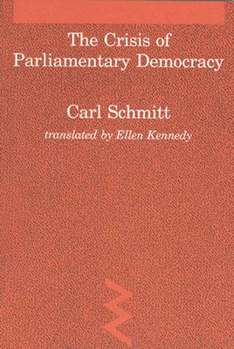The Crisis of Parliamentary Democracy
Select Format
Select Condition 
Book Overview
The Crisis of Parliamentary Democracy offers a powerful criticism of the inconsistencies of representative democracy. Described both as "the Hobbes of our age" and as "the philosophical godfather of Nazism," Carl Schmitt was a brilliant and controversial political theorist whose doctrine of political leadership and critique of liberal democratic ideals distinguish him as one of the most original contributors to modern political theory...
Format:Paperback
Language:English
ISBN:0262691264
ISBN13:9780262691260
Release Date:June 1988
Publisher:MIT Press
Length:184 Pages
Weight:0.48 lbs.
Dimensions:0.5" x 5.3" x 7.9"
Age Range:18 years and up
Grade Range:Postsecondary and higher
Customer Reviews
2 ratings
Debunking liberal democracy
Published by Thriftbooks.com User , 17 years ago
Carl Schmitt's _Crisis of Parliamentary Democracy_ offers a trenchant, and largely convincing critique of liberal democracy. Ultimately, however, it is disappointing in that it fails to offer solutions to the problems it identifies. Schmitt begins his critique of parliamentary democracy by rejecting the standard argument marshalled in its defence -- that whatever its flaws, it should be sustained, because all other known systems of government are worse. Schmitt argues that a principled defence of parliamentary democracy must do more than simply declare "What else?" Schmitt proceeds to define democracy, and parliamentarism in a way that most 21st century liberal democrats will find peculiar, as two philosophies of government that are in fact fundamentally different, and do not necessarily complement one another. In constructing a definition of democracy, Schmitt turns to Aristotle and Rousseau. Democracy requires that equals be treated equally, and unequals, unequally (9).* Thus, there is always a condition one must satisfy to be granted equal political rights. In an Aristotelian democracy, that condition is 'virtue'. Only the virtuous or excellent have full rights as citizens. In the 19th century version, full political rights belong to those who are members of "the nation" (9). In other words, democracy demands 'homogeneity' either in virtue, nationality, or some other category. The idea of granting political rights to everyone, without any qualification for membership in the political community, is not a democratic, but a liberal idea, says Schmitt (11). Liberalism proposes something which is utterly absurd, a "democracy of mankind" (11). Moreover, following Rousseau, Schmitt says that democracy expresses the people's 'general will', which only exists where the people are so homogeneous that there is essential unanimity (13). Defined in this way, democracy is very different from parliamentarism. Citing Burke, Bentham, Guizot and J.S. Mill, Schmitt argues that parliamentarism is a system of government whose philosophical justification lies in the supposed value of 'open discussion'. The essence of parliamentarism is not that it is a form of representative government, but that it is a form of deliberative government. The purpose of a parliament or congress is that parliamentarians or congressmen should deliberate upon important affairs of state and devise appropriate policies. The truth, or the right policy, is supposed to result from discussion, from the competition of different opinions and ideas, and from the capacity and willingness of the parliamentarians to persuade and be persuaded as to the best course of action for the political community as a whole (5, 46). Now, in the real world, argues Schmitt, 'parliamentary democracy' is neither parliamentary nor democratic. In the first place, policies in parliamentary governments are not arrived at through open discussion of affairs of state among the hundreds of members who compose t
Liberalism vs. Democracy
Published by Thriftbooks.com User , 21 years ago
This book is a must-read for those who are interested in fostering Western democratic-liberal ideals in currently authoritarian regimes. Schmitt challenges the seamless grouping of liberal ideals and democratic ideals, and argues that the principles of liberalism and democracy actually stand in direct contradiction. Schmitt bases this claim on the exclusionary nature--the identification of the "other"--in historical democracies. That is, for instance, the Athenian political body understood itself as specifically non-Spartan, as well as non-female and non-slave. Similarly, South African democracy during apartheid, Israeli democracy today, and US democracy in previous centuries were similarly formed and fostered by the exclusion of the "other". The principles of liberalism on the other hand respect all persons simply as persons, and do not differentiate in law between individuals. Thus liberalism speaks of human rights, rule of law, etc. These important insights are useful as a kind of cautionary tale as the West seeks to promote democracy around the globe. The book provides the conceptual framework for us to understand how democracies such as those in the Balkans in the 90's (or Schmitt's own Weimar Republic) could have produced such strikingly illiberal results.






